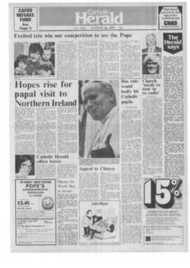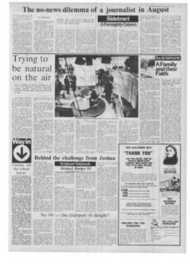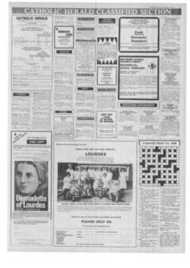Page 3, 24th August 1979
Page 3

Report an error
Noticed an error on this page?If you've noticed an error in this article please click here to report it.
Tags
Share
Related articles
Escape From Madman Of Malabo
More Equatorial Guinea Executions
Equatorial Guinea — 1 Priest Left
News In Brief
Priests In Guinea `forbidden To Preach'
Churches reopen as dictator is ousted
CATHOLIC churches have been reopened in Equatorial Guinea bringing hopes that more than 10 years of persecution, perpetrated by the deposed dictator Francisco Macias Nguema, will end.
1 he reopening of the churches was one of the first acts of the new government which is led by Theodore Nguema Mbozogo, a vice minister of defence under Macias.
The coup against Macias, who came to power in 1968 when the country gained independence From Spain, ended what has been generally regarded as one of the most ruthless governments in Africa. Victims included real and imagined political opponents, with the Catholic Church high on the list. Macias was "totally ruthless in liquidating political opponents," according to a 1978 report by the International Commission of Jurists, an independent human rights agency.
Amnesty Internation, another human rights agency, said Macias turned the country into "an immense torture chamber."
Nlacias became the first elected president after independence. His initial attacks against theCatholic Church were part of efforts to "decolonise" the country by removing symbols of two centuries of Spanish rule. He considered the Catholic Church as too closely aligned to the colonial government. Macias was educated as a Catholic, but became a militant atheist.
"I he persecution of the church affected a majority of the —population because 60 per cent of the people profess Catholicism and the moves against the church were also part of Macias's overall measures to establish an iron Francisco Macias gusima fisted rule which resulted in the massive exodus of Equatorial Guineans. According to refugee sources, about 150,000 of the 450,000 population have fled since 1968.
In 1971, he expelled the first group of Spanish missionaries, including Bishop Francisco Gomez Marijuan of Malabo, the capital of the country. Bishop Gomez had been a missionary in Equatorial Guinea since 1931. In April 1972 he expelled Bishop Rafael Nze Abuy of Bata, a native black.
By 1972, Macias also had appointed himself president for life and called himself "Equatorial Guinea's only true miracle." Refugee sources say many of Macias' actions were efforts to virtually deify himself. He forced people to recite his name while making the Sign of the Cross, they said.
Macias also mocked Christian tradition by publicly crucifying political opponents, forcing them first to carry their crosses, added refugees. Most of the knowledge about the Macias dictatorship comes from refugee sources and the outside monitoring of news broadcasts. Macias virtually forbade contact with the outside world and for past seven years, foreign journalists have been barred from entering the country under threat of capital punishment.
Many countries severed ties with Equatorial Guinea as the repressive measures earned Macias the title of "Madman of Malabo." Al the time of the coup, France was the only Western nation having an ambassador in the country. The United States suspended diplomatic relations in 1976.
Refugees said the only foreigners Macias welcomed were a handful of Cubans and Russians.
Refugee and church sources say persecution of Catholics included: the confiscation of Catholic schools; the closing of churches, transforming them into warehouses; persecution of church personnel; the charging of ransom for the release of foreign prisoners, including missionaries. In one case, Spain paid $50.000 for the release of six Spanish priests.
In 1975 the Vatican Congregation for the Evangelization of People said the government had closed down all three Catholic seminaries and a year later a decree was published prohibiting parents from giving Christian names to their children.
• At the time of the coup, only one missionary priest and 20 native priests were believed to be in the country.
blog comments powered by Disqus











